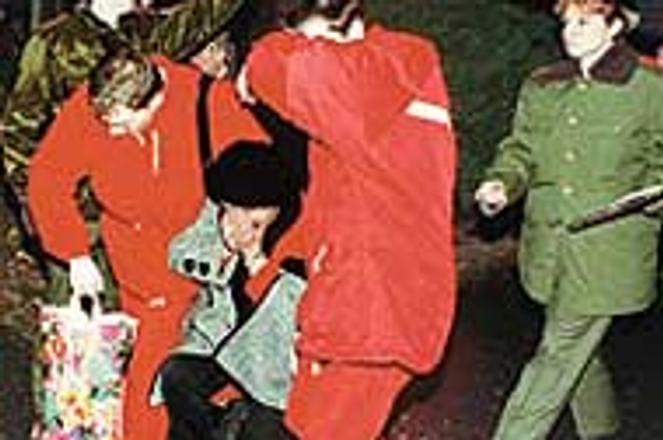Ján Ducký's wife breaks down at her husband's murder scene.photo: TASR
During his January 1 public address to the nation, Prime Minister Mikuláš Dzurinda took the opportunity to spell out the government's stance against crime for the year to come.
"The year 1999 will be the year of an uncompromising fight against criminals, blackmailers and the underworld," he said. "The mafia is like a cancer - it is an insidious disease and we have to fight it. We have to act fast."
Statistics show that the government's 1999 goals were not met. According to the Slovak Police Presidium in Bratislava, 12,526 violent crimes were reported during the first 11 months of the year, up from 11,515 during the same period in 1998. Murders, robberies and rapes also recorded increases in 1999.
The government did deal successfully with a handful of high-profile crimes, particularly those supposedly committed by its erstwhile political foes. However, mafia violence continued apace, skinhead incidents surged in the summertime, and many citizens were left with a feeling of insecurity while walking their city streets.
Less than two weeks after Dzurinda's speech, Ján Ducký, a former Minister of Economy in the 1994-1998 Mečiar cabinet, was murdered in Bratislava. Ducký had been under investigation for gross financial mismanagement during his tenure as the head of the state gas company SPP.
Vladimír Jančura, a reporter for the Pravda daily newspaper who covered Ducký and the SPP regularly, said he had not been surprised by the murder. "People who knew him closely said he was playing with fire," Jancura said. "He showed many times that he was able to enter radioactive areas and emerge with his skin intact."
On February 1, Mečiar's HZDS party was again in the headlines when the Interior Ministry requested Parliament to lift the parliamentary immunity from prosecution of two HZDS officials - Gustáv Krajči and Ivan Lexa - so criminal charges could be laid.
Parliament complied with the request, and both men were stripped of their immunity. Krajči, a former Interior Minister in the Mečiar cabinet, was accused of "abuse of power and fraud" in connection with a thwarted 1997 NATO and presidential referendum, while Lexa, the former boss of the Slovak secret service (SIS), faced charges of fraud and abuse of power in the infamous 1995 kidnapping of Michal Kováč Jr., the former president's son.
Soon thereafter, Lexa was further implicated by an SIS report chronicling the activities of the secret service during the Mečiar era. The report outlined the SIS's involvement in the Kováč Jr. kidnapping, illegal surveillance practices, and attempts to stir anti-Hungarian and anti-Romany sentiments across international borders.
Lexa was jailed on April 15, but was released three months later in a surprise move by the Bratislava Regional Court while his investigation continued.
The Mafia also grabbed media attention in 1999, as the number of brutal murders and turf wars escalated during the year. On March 25 in a Dunajská Streda restaurant, 10 mafia mobsters were gunned down by two men with machine guns while playing cards
"The murderers shot 114 bullets at 10 targeted men in less than a minute," said Interior Ministry Investigation Director Jaroslav Ivor.
On August 4, Peter 'Žaluď' Steinhubel, a notorious Bratislava underworld figure, was gunned down in the capital. Former HZDS MP and party co-founder Vlastimil Vicen was among the mourners at the August 9 funeral.
On November 29, Košice mob boss Miroslav S. was murdered when an unknown assailant attacked him with a machete and then shot him at close range in a Košice restaurant.
The police did attempt to fight back, launching on November 8 the trial of Banská Bystrica mob boss Mikuláš Černák, "the largest organized crime trial in central European history" according to Justice Ministry Office Director Daniel Lipšic. Černák is being tried with eight alleged accomplices for murder, extortion, kidnapping and tax evasion; a verdict is expected shortly before Christmas.
But violent crimes were not limited to the mafia in 1999. A series of racial beatings in the nation's capital during the summer months drew heavy criticism of the police from both foreign and domestic observers.
In June, Libyan diplomats in Slovakia reported that two of their sons had been attacked by skinheads and that similar attacks had also occurred on Arab students in Bratislava. In July, a Chinese diplomat was beaten by a gang of short-haired youths on a Bratislava bus, leaving him temporarily in a coma. Two British citizens of Asian origin were also attacked in July.
The latest skin-head attack occurred on October 9 when three white males with shaved heads and tattooed knuckles attacked a 26-year-old Peruvian student, John Sanchez Bendezu, at the Institute for Language and Academic Preparation for Foreign Students in Bratislava. Police then intercepted and delayed the vehicle carrying Bendezu to hospital, levying fines against his fellow students when they could not produce proper identification.
Perhaps the most horrific and senseless incident occured when a gunman opened fire in Bratislava's Irish Pub on July 7, killing two men and wounding another. One of the men killed was Tomaš Arnold, who had been working at a Bratislava HypoVereinsbank branch. Arnold, who was married with a one-year old daughter, had been celebrating his recent graduation from university.


